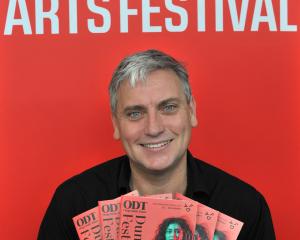
Its collision of expediency and morality makes it a political thriller for our own time, and a new translation for the Globe by Dunedin’s Keith Scott keeps Schiller’s essentials, while tightening up the plot and just slightly changing the ending.
In a play with 15 characters, most of the attention is on the three women. Mary is played confidently and sympathetically by Helen Fearnley.
Terry MacTavish boldly takes the part of the fearsome Elizabeth, and the third woman, Mary’s lady-in-waiting Jane Kennedy, is played by Emer Lyons.
When Mary and Elizabeth meet the clash of uncompromising entitlement contrasts with the fact that both are highly constrained — Mary because she is literally a prisoner, Elizabeth because of her place in history and her own fallibility.
The women wear gorgeous, historically accurate costumes, designed by Charmian Smith after considerable research and made, with the aid of assistant sewers, over the last several months.
Costumes so accurately and exquisitely detailed are, in themselves, worth coming to the theatre to see.
The men, on the other hand, are less individualised, and wear unremarkable modern clothing.
Scott (who also designed the sets and directs the production) characterises them as timeless politicians and functionaries who get things done, and, in a manner familiar to us all, rationalise, insinuate, obfuscate and obstruct.
Especially noteworthy performances come from Paul Ellicott as the duplicitous Leicester, Ashley Stewart as Mortimer, Thomas Makinson, splendidly French as Aubespine, and Nigel Ensor as Shrewsbury.
Mary Stuart is the most ambitious production to date in the newly renovated theatre, and a fine and successful contribution to the Arts Festival.
Mary Stuart
Globe Theatre, Thursday, September 29











